★★★
“Truly a book of two halves, Brian.”
 Coincidentally, a year after the first collection, I find the time to read volume two; this contains two stories rather than two-and-a-fragment, but weighs in at about forty pages or so longer. Same price though, I am pleased to note… The first, Legion, takes our FBI agent and her semi-vampiric colleagues off to the post-flood city of New Orleans where a demonic force has been unleashed, which is capable of transferring its presence from one body to another. Hmmm…sounds not unlike Fallen, perhaps? That aside, I did enjoy this one thoroughly: the pace is good and, if the eventual destination of the entity is not perhaps a surprise (it’s quite close to the pair, shall we say), it makes for some great set-pieces. The best of these involves a church where the possessed victim is resting up, which results in a hellacious battle that’s genuinely exciting. The story elements are tidied up nicely too, leaving this a self-contained and effective tale.
Coincidentally, a year after the first collection, I find the time to read volume two; this contains two stories rather than two-and-a-fragment, but weighs in at about forty pages or so longer. Same price though, I am pleased to note… The first, Legion, takes our FBI agent and her semi-vampiric colleagues off to the post-flood city of New Orleans where a demonic force has been unleashed, which is capable of transferring its presence from one body to another. Hmmm…sounds not unlike Fallen, perhaps? That aside, I did enjoy this one thoroughly: the pace is good and, if the eventual destination of the entity is not perhaps a surprise (it’s quite close to the pair, shall we say), it makes for some great set-pieces. The best of these involves a church where the possessed victim is resting up, which results in a hellacious battle that’s genuinely exciting. The story elements are tidied up nicely too, leaving this a self-contained and effective tale.
However, despite the second story possessing a great title – The Phantom of the Soap Opera – I was much less engaged by it. The set of a daytime TV drama is plagued by mysterious ‘accidents’ of an occult nature, which leads to the pair re-uniting in order to investigate, triggered by a call from an old friend of Scarletti’s. There is just not enough meat on the bones of this one, though perhaps Koehler wasn’t happy with it either, since there is a lot of back-story added here. Indeed, to such a degree that it burdens the main characters, and its relevance to the main plot is doubtful. I’m also growing rather disillusioned by Blackburn’s relationship to the Jackal, the full vampire who saved her life in volume one; Koehler is treading dangerously close here, to the cliches which eventually sank the Anita Blake series.
Another small peeve was a surprising number of typos in the volume, such as “a traveling bad slung over one shoulder.” Though I’m far from immune to these myself [even if you can only have the ‘u’ in ‘colour’ when you pry it from my cold, dead hands, dammit], and I did smile at one, when Blackburn was served by a “gun-chewing waitress.” I’d be sure to leave her a good tip. Overall, not quite as good as the first compilation, though that’s largely down to the second story – individually, Legion rates a ****, but Phantom only **, getting stuck in a morass of its own making. While that leaves the review ending on a disappointing note, Blackburn remains an engaging heroine, and if Koehler can get back to more action-oriented writing in the next volume (as she showed herself eminently capable of in Legion), I’ll be waiting eagerly.






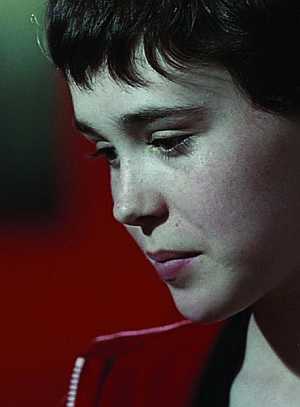 This is almost unbearably creepy, in two different directions: however, it’s almost impossible to discuss this film in any meaningful way without spoilers, so you have been warned. The danger of online predators is well-known, and when fourteen-year old Hayley (Page) agrees to meet photographer Jeff (Wilson), who is in his thirties, alarm bells are ringing. They reach a piercing level after she goes to his house, starts drinking vodka and flirting outrageously. However, the tables are abruptly turned: she’s spiked Jeff’s drink, and he wakes to find himself tied-up, and entirely at Hayley’s mercy. He soon finds out that’s a quality she is very definitely
This is almost unbearably creepy, in two different directions: however, it’s almost impossible to discuss this film in any meaningful way without spoilers, so you have been warned. The danger of online predators is well-known, and when fourteen-year old Hayley (Page) agrees to meet photographer Jeff (Wilson), who is in his thirties, alarm bells are ringing. They reach a piercing level after she goes to his house, starts drinking vodka and flirting outrageously. However, the tables are abruptly turned: she’s spiked Jeff’s drink, and he wakes to find himself tied-up, and entirely at Hayley’s mercy. He soon finds out that’s a quality she is very definitely 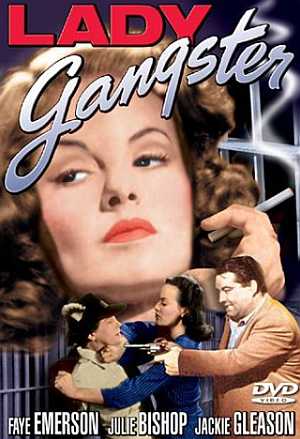 Having watched both Transformers and Miami Vice over the past week, it’s nice to see a film that doesn’t hang around: coming in at sixty-two minutes, Lady Gangster has hardly a line of dialogue that does not propel the story forward. Based on the play, Ladies They Talk About (previously a 1933 film starring Barbara Stanwyck), this centers on Dorothy Burton, member of a gang of bank-robbers. She takes the rap for one of their jobs, and goes to jail, but is also the only one who knows where the loot is hidden. Childhood friend Kenneth Phillips (Wilcox), now a renowned broadcaster, tries to help Dorothy get parole, but she has also made an enemy inside the prison, who is just as keen our heroine does not get released, and her former gang colleagues have their own interests, needless to say.
Having watched both Transformers and Miami Vice over the past week, it’s nice to see a film that doesn’t hang around: coming in at sixty-two minutes, Lady Gangster has hardly a line of dialogue that does not propel the story forward. Based on the play, Ladies They Talk About (previously a 1933 film starring Barbara Stanwyck), this centers on Dorothy Burton, member of a gang of bank-robbers. She takes the rap for one of their jobs, and goes to jail, but is also the only one who knows where the loot is hidden. Childhood friend Kenneth Phillips (Wilcox), now a renowned broadcaster, tries to help Dorothy get parole, but she has also made an enemy inside the prison, who is just as keen our heroine does not get released, and her former gang colleagues have their own interests, needless to say. I think I can safely say that this films fails miserably on just about every level. Now, I am probably not the target audience for this unashamedly ‘urban’ movie, but that didn’t stop me from enjoying the works of Pam Grier. This, on the other hand… Three women (Brown, Nurse and Sha – though I’ve my suspicions that one of them might just be a man) are arrested under dubious circumstances, but are bailed out to investigate the murder of one’s brother, a rising rapper. They get employed at his record-label, the questionably-spelled Murda Boi records, to scope out the suspects. Was it his partner in the label? The sleazy CFO? Or the mail-room man?
I think I can safely say that this films fails miserably on just about every level. Now, I am probably not the target audience for this unashamedly ‘urban’ movie, but that didn’t stop me from enjoying the works of Pam Grier. This, on the other hand… Three women (Brown, Nurse and Sha – though I’ve my suspicions that one of them might just be a man) are arrested under dubious circumstances, but are bailed out to investigate the murder of one’s brother, a rising rapper. They get employed at his record-label, the questionably-spelled Murda Boi records, to scope out the suspects. Was it his partner in the label? The sleazy CFO? Or the mail-room man?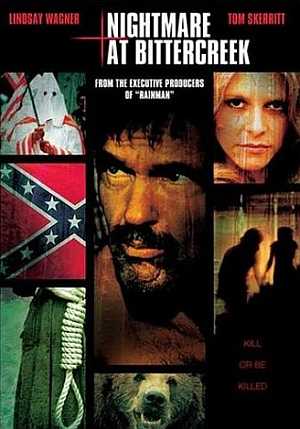 Nita Daniels (Wagner) and her three girlfriends take a horseback trip up the mountain, expecting to meet their husbands at the top. However, the trip becomes a nightmare, as four members of the ‘Aryan Survivalist Brigade’ are holed up there, and decide to take out the women and their alcoholic guide, Ding (Skerritt). Initially, Ding takes the fore, but when he is injured it’s up to Nita and her pals to fight back. This TVM struggles, largely because of the lack of justification for the white supremacists: the entire party they attack are about as Aryan as they come, so why, exactly, should they be targeted for elimination? It would have been far more plausible had the party been ethnically-mixed, or even their guide been black – or, heck, Jewish.
Nita Daniels (Wagner) and her three girlfriends take a horseback trip up the mountain, expecting to meet their husbands at the top. However, the trip becomes a nightmare, as four members of the ‘Aryan Survivalist Brigade’ are holed up there, and decide to take out the women and their alcoholic guide, Ding (Skerritt). Initially, Ding takes the fore, but when he is injured it’s up to Nita and her pals to fight back. This TVM struggles, largely because of the lack of justification for the white supremacists: the entire party they attack are about as Aryan as they come, so why, exactly, should they be targeted for elimination? It would have been far more plausible had the party been ethnically-mixed, or even their guide been black – or, heck, Jewish.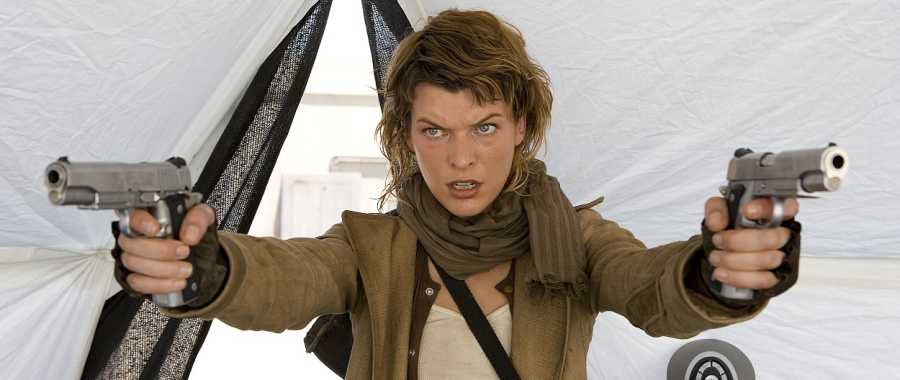 ★★★
★★★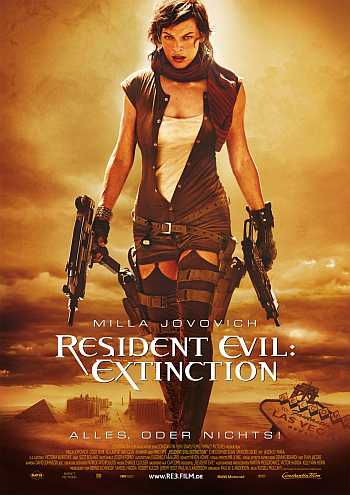 Has it really been three years since the last installment? Guess so. Therefore, about time for the most durable of the video-game to movie franchises, to pop up with another entry. Things continue to go from bad to worse as far as Planet Earth is concerned, with the T-virus, which spread from the complex to Raccoon City last time, now infecting the entire world. A few survivors roam the wastelands, such as in a convoy led by Claire Redfield (Larter), unable to stay in one place too long, because the zombies will locate them. Meanwhile, Dr. Isaacs (Glen) is working on reversing the virus, or at least making the zombies docile – though his approach to scientific teamwork leaves a little to be desired, shall we say. He also has a pit where he disposes of his raw material, an aspect that reminded me of the original Aeon Flux short films.
Has it really been three years since the last installment? Guess so. Therefore, about time for the most durable of the video-game to movie franchises, to pop up with another entry. Things continue to go from bad to worse as far as Planet Earth is concerned, with the T-virus, which spread from the complex to Raccoon City last time, now infecting the entire world. A few survivors roam the wastelands, such as in a convoy led by Claire Redfield (Larter), unable to stay in one place too long, because the zombies will locate them. Meanwhile, Dr. Isaacs (Glen) is working on reversing the virus, or at least making the zombies docile – though his approach to scientific teamwork leaves a little to be desired, shall we say. He also has a pit where he disposes of his raw material, an aspect that reminded me of the original Aeon Flux short films.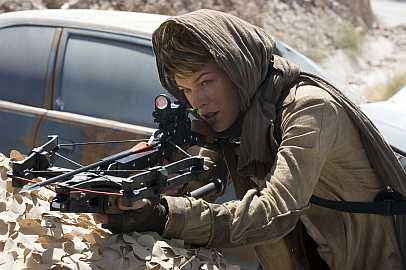 The main problem, I feel, is that giving Alice mental powers detracts from the physical side of action, which has always been a major part of this series’s appeal: watching Jovovich kick zombie butt. The Las Vegas battle is unquestionably the highlight of the film as far as that goes, with Alice adopting a no-nonsense, slice-and-dice approach, that’s a gleeful joy to watch. After it, however, things go somewhat wonky: the entire Redfield subplot is airily waved away, and then there’s the inevitable boss level fight – this time against the Tyrant [if you’ve played the games, you probably know what that is, which puts you one-up on me], a somewhat rubbery, tenticular beast that is not among Patrick Tatopoulos’s best work.
The main problem, I feel, is that giving Alice mental powers detracts from the physical side of action, which has always been a major part of this series’s appeal: watching Jovovich kick zombie butt. The Las Vegas battle is unquestionably the highlight of the film as far as that goes, with Alice adopting a no-nonsense, slice-and-dice approach, that’s a gleeful joy to watch. After it, however, things go somewhat wonky: the entire Redfield subplot is airily waved away, and then there’s the inevitable boss level fight – this time against the Tyrant [if you’ve played the games, you probably know what that is, which puts you one-up on me], a somewhat rubbery, tenticular beast that is not among Patrick Tatopoulos’s best work. Things do perk up at the very end. As in the first two films, there’s a grand final shot, which leaves you eagerly anticipating the next part – in this case, presumably called Resident Evil: Globapocarnarmagediediedie. Certainly, I wouldn’t be
Things do perk up at the very end. As in the first two films, there’s a grand final shot, which leaves you eagerly anticipating the next part – in this case, presumably called Resident Evil: Globapocarnarmagediediedie. Certainly, I wouldn’t be 










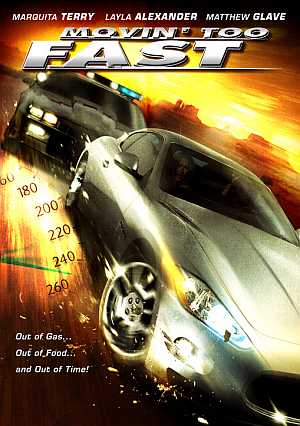 Yes, while there may not be a lot new here, the combination is at least somewhat interesting, and it’s put together solidly enough. Two students, Nina (Alexander) and Melissa (Terry) are on a cross-country drive, when they get stopped for speeding. Melissa makes a pass at the cop, but it’s an encounter that goes badly wrong, and she ends up beating him up with his own night-stick. When the duo get back on the road however, they find themselves being pursued by a police-car, which clearly has very bad intentions: with gas running low and – inevitably – no cellphone service to be found, can they survive?
Yes, while there may not be a lot new here, the combination is at least somewhat interesting, and it’s put together solidly enough. Two students, Nina (Alexander) and Melissa (Terry) are on a cross-country drive, when they get stopped for speeding. Melissa makes a pass at the cop, but it’s an encounter that goes badly wrong, and she ends up beating him up with his own night-stick. When the duo get back on the road however, they find themselves being pursued by a police-car, which clearly has very bad intentions: with gas running low and – inevitably – no cellphone service to be found, can they survive?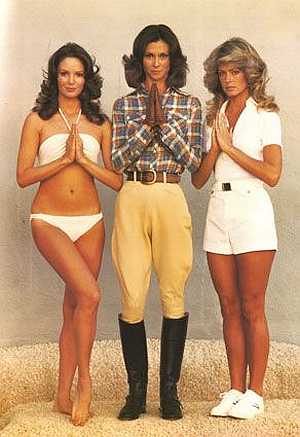 I suppose my main surprise is how pedestrian this was. Action? Hardly anything to speak of at all, despite the credit sequence which shows them training as police officers. The story has them going undercover at a vineyard, whose owner vanished seven years ago, and is about to be declared legally-dead: his ex-wife (Muldaur) and the sleazy foreman will clean up…unless the daughter, also missing, shows up. Of course, the Angels play both a fake daughter (Smith) and the ‘real’ thing (Jackson) – the former is designed to be exposed, in order to get herself involved with the wife and foreman, and reveal what’s going on. Quite cunning, really.
I suppose my main surprise is how pedestrian this was. Action? Hardly anything to speak of at all, despite the credit sequence which shows them training as police officers. The story has them going undercover at a vineyard, whose owner vanished seven years ago, and is about to be declared legally-dead: his ex-wife (Muldaur) and the sleazy foreman will clean up…unless the daughter, also missing, shows up. Of course, the Angels play both a fake daughter (Smith) and the ‘real’ thing (Jackson) – the former is designed to be exposed, in order to get herself involved with the wife and foreman, and reveal what’s going on. Quite cunning, really.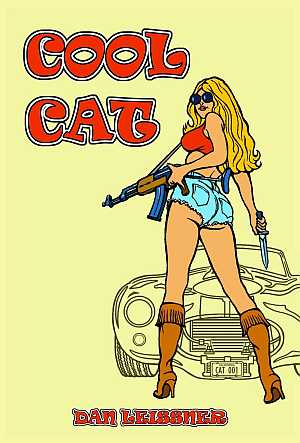
 Sometimes, you just have to sit back and let the DVD sleeve do the talking. “The notorious serial killer, Harry Eugene Loveless AKA Mr. HELL roamed from town-to-town and job-to-job, brutally murdering his victims, with the demonic intention of removing the ‘windows to the soul’ – their eyes! Mr. HELL mutilated Dr. Karl Matthews at a government laboratory where biological weapons were secretly being developed. The daughter’s precocious daughter, Tyler, who discovered her father’s body with his eyes missing, was then pursued by Harry through the lab’s subterranean tunnels. During the chase, Harry was accidentally destroyed by toxic industrial acid, and his remains flowed into a storage container. Was this the end for Mr. HELL?
Sometimes, you just have to sit back and let the DVD sleeve do the talking. “The notorious serial killer, Harry Eugene Loveless AKA Mr. HELL roamed from town-to-town and job-to-job, brutally murdering his victims, with the demonic intention of removing the ‘windows to the soul’ – their eyes! Mr. HELL mutilated Dr. Karl Matthews at a government laboratory where biological weapons were secretly being developed. The daughter’s precocious daughter, Tyler, who discovered her father’s body with his eyes missing, was then pursued by Harry through the lab’s subterranean tunnels. During the chase, Harry was accidentally destroyed by toxic industrial acid, and his remains flowed into a storage container. Was this the end for Mr. HELL?